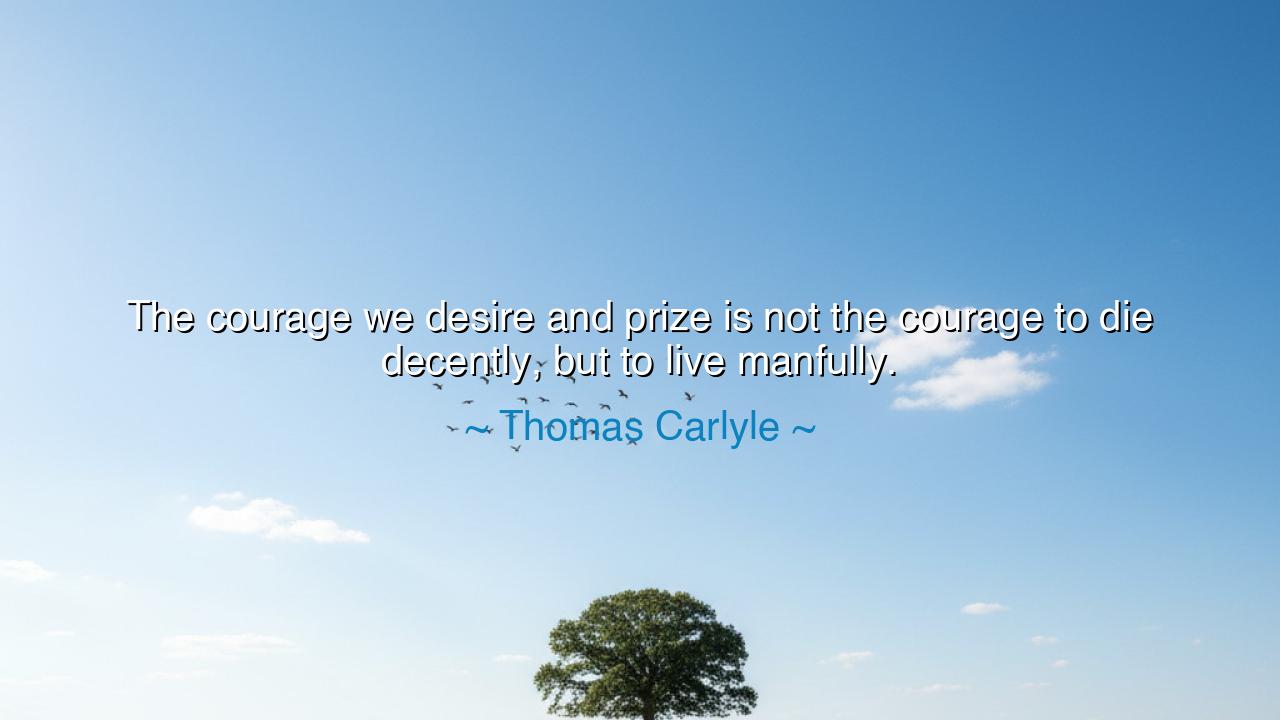
The courage we desire and prize is not the courage to die
The courage we desire and prize is not the courage to die decently, but to live manfully.






“The courage we desire and prize is not the courage to die decently, but to live manfully.” – Thomas Carlyle
In these words of fire and steel, Thomas Carlyle, the prophet of moral strength and spiritual labor, reveals the truest and rarest form of courage. He declares that the bravery most worthy of admiration is not found in the moment of death, but in the long, unending struggle of life itself. Many can face death with sudden valor; few can face life with daily endurance. To die decently is an act of a moment, but to live manfully — to live with integrity, perseverance, and faith in the face of despair — is the act of a lifetime. Carlyle’s words call us to awaken from the illusion that heroism is only born in battlefields or martyrdom; it also lives in the quiet heart that rises again after every fall.
The origin of this truth lies deep within Carlyle’s philosophy of moral duty and human purpose. Writing during the turbulent 19th century — an age of industrial upheaval and spiritual disillusionment — he sought to remind his generation that greatness is not found in ease but in effort. For Carlyle, life itself is a sacred battle, and the true hero is not the one who escapes its hardships through death, but the one who stands firm amidst its storms. “Living manfully” meant living with discipline, honor, and faith, even when the world grows dark and the soul is weary. He saw courage not as a flash of glory but as a flame that must be kept burning through the coldest nights of existence.
To live manfully is to endure the slow trials that do not win applause — to work when one is weary, to love when one is hurt, to keep faith when one is afraid. It is the courage of the parent who toils for their children without recognition; the courage of the dreamer who labors despite ridicule; the courage of the broken who rise once more, silently and without bitterness. Death, in its finality, can be noble — but life, with its endless demands, requires a nobility that renews itself daily. Carlyle understood that true bravery lies not in escaping suffering, but in bearing it with dignity and transforming it into strength.
History offers us many examples of this quiet heroism. Consider Nelson Mandela, who spent twenty-seven years in a prison cell, his body confined but his spirit unbroken. The world saw his triumph when he walked free, but the greater triumph had already occurred within — the daily decision to live manfully through injustice, to keep faith with humanity even when humanity had betrayed him. Mandela’s courage was not the courage to die decently, though he was ready to do so; it was the courage to live decently, to forgive, to lead, to rebuild. His life teaches that endurance is the truest expression of valor — for to live each day with principle and hope requires a fiercer strength than to die for them in an instant.
The ancients, too, spoke of this wisdom. The Stoic philosopher Marcus Aurelius wrote that “a man’s worth is measured by the things he can bear.” To him, courage was not a shout of defiance but a steady flame of resolve. The soldier who meets death bravely deserves honor, but the soul who meets life’s endless weight with patience and grace deserves reverence. For the world is not sustained by the heroes who die, but by the countless men and women who live bravely — who rise at dawn, face their burdens, and carry them faithfully.
Carlyle’s teaching pierces through the ages like a clarion call: do not seek the fleeting glory of a noble death, but the enduring greatness of a noble life. Courage, in its highest form, is not the absence of fear, but the mastery of it. It is not the courage of the sword, but of the soul — the quiet strength that chooses to love despite cruelty, to create despite chaos, to believe despite doubt. This is the courage that builds civilizations, heals nations, and redeems the human spirit.
So, my children, remember this: it is easy to die for a cause, but it is harder — and holier — to live for it. The courage you must seek is not the fire that flares for a moment, but the light that burns through all seasons. Live manfully — live with integrity when the world tempts you to compromise, live with patience when the road grows long, live with faith when all else seems lost. For to live thus is to become greater than fear, greater than despair, greater even than death itself.
And when the final hour comes, you will not need to prove your courage in dying — for your whole life will have been proof enough.






AAdministratorAdministrator
Welcome, honored guests. Please leave a comment, we will respond soon